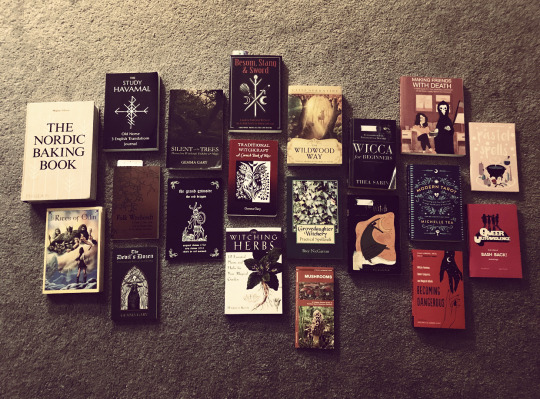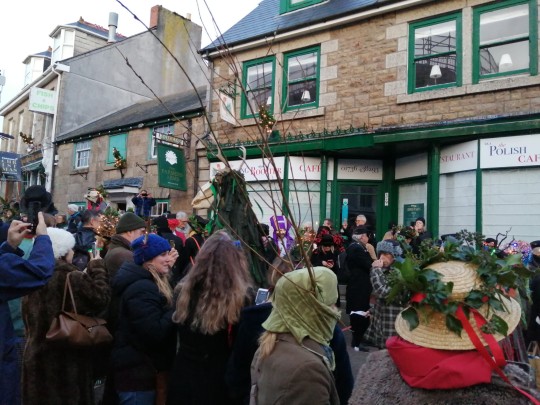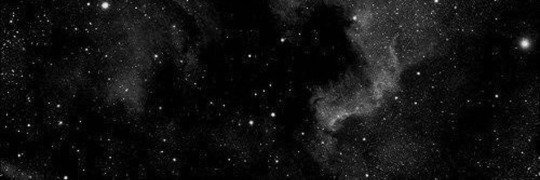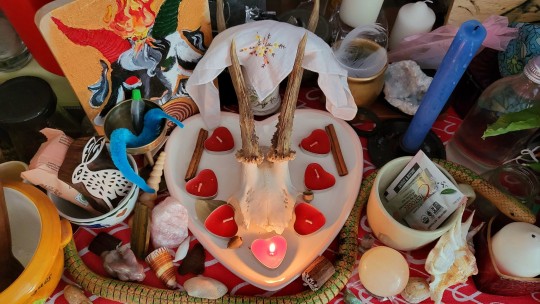#cornish polytheism
Explore tagged Tumblr posts
Text
Allantide lowen 🍎
2 notes
·
View notes
Text
Bucca as one with dominion over moorlands is such a delicious idea. While Their home is the Sea and the Weather, Cornish moorlands are so interlinked with both of those it's impossible for Them to not also have their home there.
1 note
·
View note
Note
I feel like just with any other tradition it's decided by historical precedent and especially the People, (if its based in ethnic supremacy its another story but ignoring that for now)
As an example, Mari faith. It survived Christianization to a high degree, was influenced but not replaced by it, was syncretized with it, or are practiced side by side. While there is a neo-pagan like revival I feel as if the Mari people get the final say. Same with Udmurt faith, while not as well preserved as Mari, it still heavily exists among their communities; it never died. It also has a neo-pagan like revival that exists but I believe Udmurt people get the final say. These faiths were persecuted by the Russian Empire, USSR state atheism, and now a further push of Russification in the Russian Federation.
Both of these are European. Both are living cultures and living folk traditions. I don't have the answer as to whether they are closed or opened. It might be extremely difficult to discuss the topic with an Udmurt person or Mari person without knowing Russian. I could be wrong on that last part and simply have not come across them online yet to discuss their culture. However, I'd encourage people who want to participate in those folk religions/cultures that have no ancestral ties: talk to the people. If you REALLY want to participate make an effort to talk to them.
Compare this to Greece. The ancient religion was open— we know this as a fact (Exhibit A: Alexander The Great. Exhibit B: interpretatio Graeca. Exhibit C: Serapis). I've discussed with many Greeks that modern Hellenic Polytheistic/Pagan Religion is open, if you respect Greek culture and are aware that Greeks still exist. That Hellenic Religion never vanished completely, it is still apart of Greek culture. I have also discussed this with a Hellenic Polytheist organization from Greece who said that it is open. (As opposed to a very ethno-nationalistic form of "Greece is for Greeks" type organization that attempts to talk for all Hellenic polytheists that live in Greece.) As a Greek American I have literally no issue with non-Greek people being Hellenic Polytheists: except when I see them forgetting Greek people still exist or completely disregarding culture as if it doesn't matter. (Literally saw a non-Greek Canadian claim Hellenic Polytheism wasn't Greeks' heritage and they had no claim to "Hellene" because they "gave it up" when they became Christian wtf)
Another example is Celtic Polytheism: Irish, Cornish, Manx, Breton, Scottish, and Welsh are all different cultures— "Celtic Nations". I have seen quite a lot of people from these cultures being frustrated about how all deities, traditions, stories are melded into a pan-Celtic pantheon & tradition without even an attempt to learn the separations. Refusal or lack of interest in learning differences in festivals, cultures, histories, or languages. I've never seen them call it closed, only that they want the different nations/cultures to be respected and at least have an understanding that differences exist. Also that the languages, cultures, and people still exist.
I don't have personal experience reading a lot of Slavic Polytheist opinions on here. But there are MANY ethnicities/nations that are "Slavic" and I imagine, just like Celts, they would prefer their differences be recognized and respected.
In addition, immigration within Europe from an ethnicities' traditional homeland to another location within Europe (including unfortunate forced relocation). They may have brought their folk traditions with them, adopted the surrounding culture's ones, or mixed them! AND the many immigrants who came from outside Europe. They may have also brought their own traditions with them, adopted the ones in the place they settled in, or have mixed them together.
Not only that, ethnicity & nationality, is much more than blood. Culture, upbringing, language(s), location, music, cuisine, traditional dress, history, religion etc etc etc is often considered what defines the ethnicity, culture, and its folk traditions; more so than blood or skin tone. This would include ethnic & local folk religions and traditions. I'll use myself as an example, (other then ethnic supremacists), I've known many Greeks, both in the diaspora and in Greece, that consider me a Greek American due to my upbringing and passed on heritage, not because of my adoptive mother's blood/genetics.
I could go on and on. The number of "Sovereign Nation States" in Europe in no way shape or form reflects the diversity of ethnicities in Europe— have you ever heard of the Karelians, Wallons, Rusyns, Sorbs (Lusatians), Izhorians, Sami, Faroe Islanders etc?
I think its a silly question because its so broad— Ask. The. People.
Europe is extremely ethnically, racially, and linguistically diverse. More than we give it credit for.
---
I have a whole draft about "dead religion" appropriation and open/closed that would seem excellent here but I've been too worried & scared to edit and post.
-Dyslexia: did my best to audio proof read for once-
What’s your stance on white Americans appropriating local European folk traditions? Does this count as cultural appropriation? Or is it Volkist to say so?
Your question appears to frame Europeans as if they're all white and culturally monolithic/interchangeable.
#also afraid to post this#cultural appropriation#reblogresponse#steppingontoes#ofthetheoi#europe#ethnicities in europe are more numerous than youd think#like just look at the traditional folk dress differences from different areas of the modern Hellenic Republic#also why do i have a desire to like learn every language#obviously spanish and greek make sense#but why Udmurt?#like why do I have a desire for that?#lets be real i just love languages and endangered languages hurt my heart#knowing theyll survive warms my heart#fuck yes to all revitalization preservation and reconstruction language programs out there#greek#celtic#slavic#udmurt#mari#scottish#irish#welsh#cornish#manx#breton#polytheism#folk traditions#folk religion#ethnicity
126 notes
·
View notes
Text
Hello I am again requesting information if you have it! This time about Cornish/Devon Druidism. I know that there is limited info about Druidism & Celtic Polytheism in general but especially about Cornish and Devon practices. I would settle for even Welsh Druidism information as it’s hypothesized that they might have been very similar.
Books, Podcasts, YouTube’s, PDFs, anything you’ve got! Not only info about the practices but also history! I’ve been just reading about Druidism in general, but I know that the Celtic Polytheism sphere has a tendency to mush Irish, Scottish, and Welsh practices together, or to only focus on Irish practices as a monolith.
If you are a Welsh, Cornish, or Devon Druidist/Polytheist I would love to follow you! Thanks for the help ~
#druidry#druidism#druidic#druidist#celtic polytheism#celtic paganism#paganism#pagan polytheism#pagan witch#paganblr#pagan community#pagans of tumblr#pagan#witchblr
11 notes
·
View notes
Text
REX BELLUM, ARTHUR GERNOW

[ID: A looping gif of waves at sea. before the viewer are smaller, daker blue waves, while behind lighter blue waves with white crests crash against once another. The scene is peaceful, yet chaotic.]
To the once and future king. Arthur, the vicious in battle and kind pagan warlord.
Dydh Da and welcome to my devotional blog to Arthur 'paganus' as I call him; essentially worshipping the religious pagan version of Arthur. Let this be a collection and discussion of essays, devotional works, personal experiences, Arthur in myth, and Arthur's various manifestations in Brythonic and greater Celtic cultures. This will largely be a focus on Kernow, as I am part Cornish, but I will include other regions featuring him such Wales, Yorkshire, Brittany, and more.
Along with this menagerie, veneration of brythonic deities and brythonic polytheism. This blog includes both Arthur the hero and Arthur as a deity, an in-between, and Arthur as a faery.
May the dead king of war rest in his grave, let us carve a future for ourselves that he will never have to return to fight for. Dead men should rest, but let it be known for him to inspire, and for our darkest hour, he shall return.
ko-fi | links directory | blog submissions | morgan's carrd.co
#dragonis.txt#king arthur worship#brythonic polytheism#brythonic paganism#king arthur deity#celtic polytheism#pagan#paganism#paganblr#celtic paganism#celtic mythology
11 notes
·
View notes
Text
If you are going to do an aesthetic of a Celtic god or goddess can you also say which nations pantheon they come from, please?
As the word, ‘Celtic’ covers six nations with different pantheons, myths, culture, language, and folklore. That while overlap has differences.
The six nations being: (1-3 being Gaelic, 4-6 being Brythonic)
Ireland (Irish)
Scotland (Scottish Gaelic)
Isle of Mann (Manx)
Wales (Welsh/Cymraeg)
Cornwall (Cornish)
Brittany (Breton)
#celtic polytheism#gaelic polytheism#brythonic polytheism#welsh polytheism#irish polytheism#breton polytheism#scottish polytheism#manx polytheism#cornish polytheism#mypractice
160 notes
·
View notes
Text
Someone asked about Irish on Duolingo, so I thought I’d reiterate that yes, Irish is available as is Welsh! Yep! Now if they’ll just add Gaelg (Manx), Kernowek (Cornish), and Brezhoneg (Breton) we’ll have all the living Celtic languages! It’s a pipe dream, I know, but a guy can hope, right?
Did everyone hear that Gàidhlig is on Duolingo now?
It went live today, it seems, unless I’m super late to the party lol

#Gaelic Polytheism#Brythonic Polytheism#Welsh Polytheism#Breton Polytheism#Cornish Polytheism#Linguistics
2K notes
·
View notes
Text
Witchy/Pagan Book List 2020

These are personal collection books and will be updated as necessary
* Please note I’m not finished reading all of these, but intend on doing reviews in the future. Not all listed are pictured
Updated - 1/29/2020
Left -> Right
Norse Paganism / Polytheism / Magic
Rites of Odin - Ed Fitch
The Study Havamal - Carrie Overton
The Nordic Baking Book (devotional purposes) - Magnus Nilsson
Icelandic Magic - Stephen Flowers
Slavic Witchcraft - Natasha Helvin
General Mythology | Anthology
The Ultimate Encyclopedia of Mythology - Arthur Cotterell and Rachel Storm
The Kalevala (Finnish epic derived from oral tradition)
Traditional Witchcraft
Folk Witchcraft - Roger J Horne
The Devil’s Dozen - Gemma Gary
Silent as the Trees - Gemma Gary
The Black Toad - Gemma Gary
Traditional Witchcraft and Cornish Book of Ways - Gemma Gary
Besom, Stang and Sword - Christopher Orapello and
Tara-Love Maguire
The Grand Grimoire | The Red Dragon (1750)
The Crooked Path - Kelden
Southern Cunning - Aaron Oberon
Green Witchcraft | Herbs | Nature | Spells
The Wildwood Way - Cliff Seruntine
Grovedaughter Witchery - @breelandwalker
Pastel Spells - @orriculum
The Witching Herbs - Harold Roth
Pocket Guide to Familiar North American Species (Mushrooms) - Kavanaugh and Leung
The House Witch - Arin Murphy-Hisock
Wicca | Sabbats
Wicca for Beginners - Thea Sabin
Seasons of the Witch - Gail Duff
Death | Death Witchcraft
Making Friends with Death - Laura Pritchett
Tarot | Divination
Modern Tarot - Michelle Tea (very good companion to any deck!)
LGBTQA+ Magic
Queer Ultraviolence - (collection of essays)
Becoming Dangerous - (collection of essays)
2K notes
·
View notes
Note
Can you help me with getting into Celtic polytheism?? I fell easily into Hellenic, just because i was an ancient Greece nerd, but with pronunciation and cluelessness on research, i dont know how to dive into Celtic. - @x-eclecticwitchqueen-x
Sure! First you’ll want to decide what kind of Celtic you want to pursue, there are three major branches, Gaelic, Brythonic, or Gaulish. The Gaelic branch encompasses Ireland, Scotland, and the Isle of Mann and the primary pantheon is the Tuatha de Dannan and related beings, such as the goddesses Brighid and the Morrigan and heroic figures like Fionn mac Cumhaill and Cuchulain. A decent approachable introduction to the lore is a Lady Gregory’s Complete Irish Mythology and the Tain translated by Thomas Kinsella. As for pronunciation, there are all sorts of guides you’ll be able to find, Lora O’Brien has a very good video on her youtube channel about pronouncing common names and terms and then googling any beginner’s Irish pronunciation will be sufficient to start with. Additional resources would include just about anything written by Lora O’Brien and Morgan Daimler, and looking up things on the Mary Jones website is good. Even just, for any of this, doing a wiki dive just to get you some baseline knowledge wouldn’t go amiss.
Outside of the Gaelic branch, I know much less. The Brythonic branch encompasses the Welsh, Cornish, and what can be gleaned about pre-Anglo Saxon Britain. The main corpus of lore are the Mabinogion, which includes gods like Ceridwen, Gwyn ap Nudd, and Blodeuwedd, and the Arthurian legends. The later of which is sorta lore, it reflects older Celtic themes and features figures from Welsh myth, but from what I know Arthur wasn’t a pre-Christian Celtic figure and may or may not be an amalgamation of figures, shaped heavily by Christian centuries that came after.
I’ll be honest, I know extremely little about Gaulish polytheism. Gaul was in what is currently France and they have a god named Belenus, that is the extent of it. There is this website you might find helpful and this book here that I found on a quick search. But I also found things about this by the Galina Krasskova, who I know of from Norse circle. She’s one of these authors to be avoided, so just be wary of that if you look into this branch.
Oh! The CR FAQ was a help to me when I first got into Gaelic polytheism. There’s reading lists on there. Off the top of my head, that’s all I can think of.
102 notes
·
View notes
Text








Montol Lowen and oh please let the sun rise
#Kernow#Montol#Winter solstice#Cornwall#Cornish#Cornish polytheism#Cornish paganism#brythonic polytheism#Brythonic paganism#Celtic polytheism#Celtic paganism
8 notes
·
View notes
Note
Hi! I hope this isn't overstepping, long story short I'm a USAmerican who recently discovered I have Cornish ancestry (my dad's mom had an affair lol and my bio grandfather came from Cornish settlers). I am starting to explore my spirituality and was curious about learning more about Cornish folkways, and maybe trying to learn some Kernewek... Is your discord server still open/active? I hope you're having a good day/night!
Yeah - my celtic server is still open! Here's a link: https://discord.gg/Rth7EubU & if you're wanting to learn kernewek then I can't reccomend dyski kernowek more
3 notes
·
View notes
Text
Bucca is a gender expansive, androgynous, dual sexed and many gendered delight. Transphobes & Transmisogynists fuck off. This isn't the blog nor the deity for you.
#consortish#when im on desk top you silly sowsnek will be thoroughly blocked from this blog as well as my main#bucca#the bucca#cornish polytheism#bucca dhu#cornish witch#celtic pagan
1 note
·
View note
Text
Haven't read where she talks about that, but I am very curious about the real folklore
Traditional witches that read Gemma Gary's interpretation of the Bucca and nothing else: Stop.
You wouldn't call any other Celtic/Brythonic deity the folk devil, or the witch-father, or any other tradcraft figure's name. Don't do it to Cornish celtic deities. The evidence Gary used to support the Bucca as a folk-devil figure comes from half-cited sources. Cornwall has lost enough to half-baked Christianisation. Some Cornish people are actually trying to find information about Them through folkloric sources & archives.
#tradcraft#bucca#the grand bucca#the united bucca#cornish witch#cornish traditional witchcraft#celtic polytheism#brythonic polytheism#cornish polytheism#celtic folklore#brythonic folklore#cornish folklore#folk witch#traditional witchcraft
129 notes
·
View notes
Text


—ℐ𝓃𝓉𝓇ℴ𝒹𝓊𝒸𝓉𝒾ℴ𝓃—

My name is Sasha. I am a cosmic/astro/lunar witch. This means: I do a lot of rituals around the moon cycles, I tend to also do intention setting based on lunar phases, and live my life by astrological and cosmic patterns and magic.
I am also an astrologer (I’ve been practicing and studying for over 6 years). I’m a Sagittarius sun, Sagittarius moon, and Cancer ascendant in Tropical Astrology. {Scorpio Sun, Sagittarius Moon, and Gemini Ascendant in Western Sidereal.} I study all types of astrology but I’m most well versed in Western Tropical and am studying Traditional Hellenistic Tropical Astrology to blend the aspects of both together.
I also do tarot, oracle, & dabble with other forms of divination. Plus, I believe myself to be claircognizant and use this to help aide in my witchery.
I consider myself an Agnostic Pagan and Witchy. I am also and animist. I identified as a Hellenic Polytheist for a while but have recently decided to explore my ancestry and it’s relation to other spiritual paths (absolutely not in a folkish or racist way btw!) I am adopted and it’s always been really hard for me, not being able to explore my ancestry and do ancestor work within my spiritual practice.
I am possibly a mix of Anglo-Saxon, Devon, & Cornish descent. My adopted family is of Scottish, Welsh, & French descent. I’m still putting together my biological family tree. This very hard for me to do as I don’t have a lot of access to info being an adoptee. (I am not claiming I have certain rights to cultures because of this, I am just trying to learn about my ancestors and their spiritual practices to find answers about my own inherent beliefs about spirituality that I was born with.)
I have always had a love for religious and philosophical studies. I had very profound spiritual experiences at a very young age (for example: I knew I was reincarnated without even really knowing what death was or about spirituality). Most people in these spaces have a similar story to starting off Christian and not being satisfied (or being traumatized) by their church. I grew up Baptist and when I could explore other options after I left home I did.
I currently research: Christian Sects (especially Catholicism and Greek Orthodoxy, but also really enjoy niche fringe sects and “folk Catholicism” or “Christian Witchcraft”), Pagan and Polytheistic religions (Hellenic Polytheism, Proto Indo-European Polytheism, Anglo-Saxon Heathenry, Norse Heathenry, & Celtic Polytheism or more specifically Cornish/Devon/Welsh Druidism), Hinduism, Buddhism, Atheism, and honestly I could add more to list but I don’t want to ramble on. This does not mean I am an eclectic witch or that I mix pantheons or practices, I just enjoy reading/studying all types of world religions and I’m still searching for the right practice for me.
This is just a place where I can share and reblog helpful info and share aspects of my craft ~
☾ ⁂ ——————— 🜸☆
𖦹 This Account Stands Against Bigotry 𖦹
This account is accepting of all people of all religions and belief systems that are not harmful to others. This account is a safe space for LGBTQA+ identities, disabled folks, mentally ill folks, plural/multiple folks, & strangers/travelers/homeless folks. This account is against racism, homophobia, transphobia, antisemitism, ALL the problematic isms.
I don’t do DNIs bc I prefer to block people.
I am happy that you are here! If I follow you back it will be from my main account @s4shiii
Feel free to send asks to get to know me more, to inquire about readings, or ask astrological questions. I do offer full paid astrological natal chart readings in Western Tropical & I also offer tarot card readings all for a sliding scale price! ~




#cosmic witch#lunar witch#astro witch#witchcraft#divination witch#tarot witch#witchblr#helpol#astrology#tropical astrology#hellenistic astrology#tarotblr#tarot#paganism#pagan polytheism#pagan#pagans of tumblr#pagan community#paganblr#pagan witch#agnostic pagan#agnostic#agnostisizm#religious studies
10 notes
·
View notes
Text

The Bucca's Stone
In Cornwall the shadow of the old gods is never far away. In the mines, offerings would be left to the Bucca and his faery kin "The Knockers", in the fields he stood as a scarecrow by day but by night lead the "Pisky" revels, but as lord of the seas and the storms he took his most majestic form.
Legend has it he was chased out of Newlyn by Paul Choir. Before he took to the air he chanted his name three times...BUCCA, BUCCA, BUCCA! But in the commotion he dropped his nets. As living proof of this take his nets still mark some of the stones around these parts...and this is one of them
from the Museum of Magic and Folklore, Aberfala, Kernow.
#bucca#bucca gwydn#bucca dhu#cornish polytheism#cornish folklore#cornwall#kernow#cornish paganism#brythonic polytheism#brythonic paganism#celtic polytheism#celtic paganism#paganism#folklore museum#consortish
76 notes
·
View notes
Text

with straw and sea campion pelt, Gwydn rises from a winter of rest, hounds sent to slumber, fauns springing forth, the heralds of a new summertide
#bucca#bucca gwydn#may day#celtic polytheism#brythonic polytheism#bucca gwidder#cornish polytheism#ankrydor#celtic deity#cornish deity#cornish witchcraft#cornish witch#folk witch#folk witchcraft#deer skull#roebuck#altar#gwydn
79 notes
·
View notes